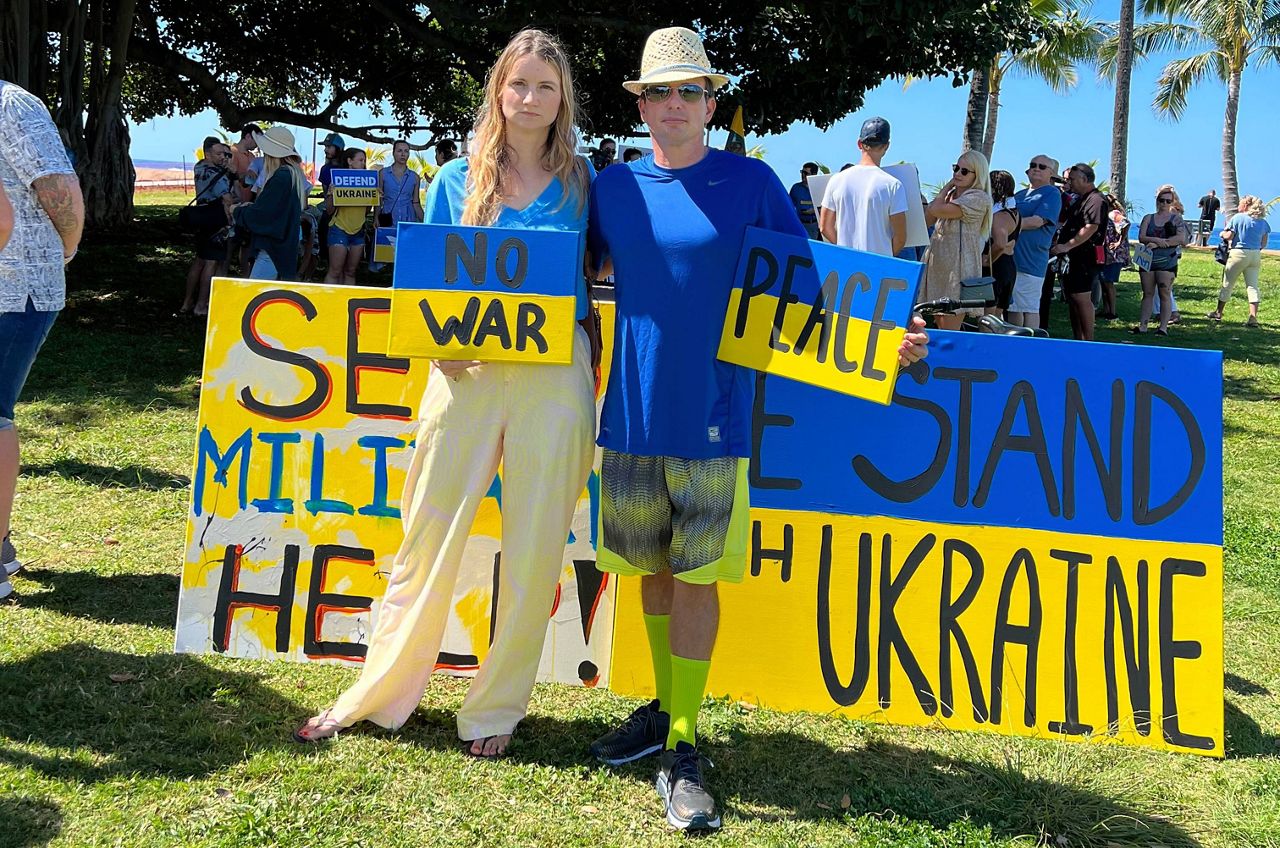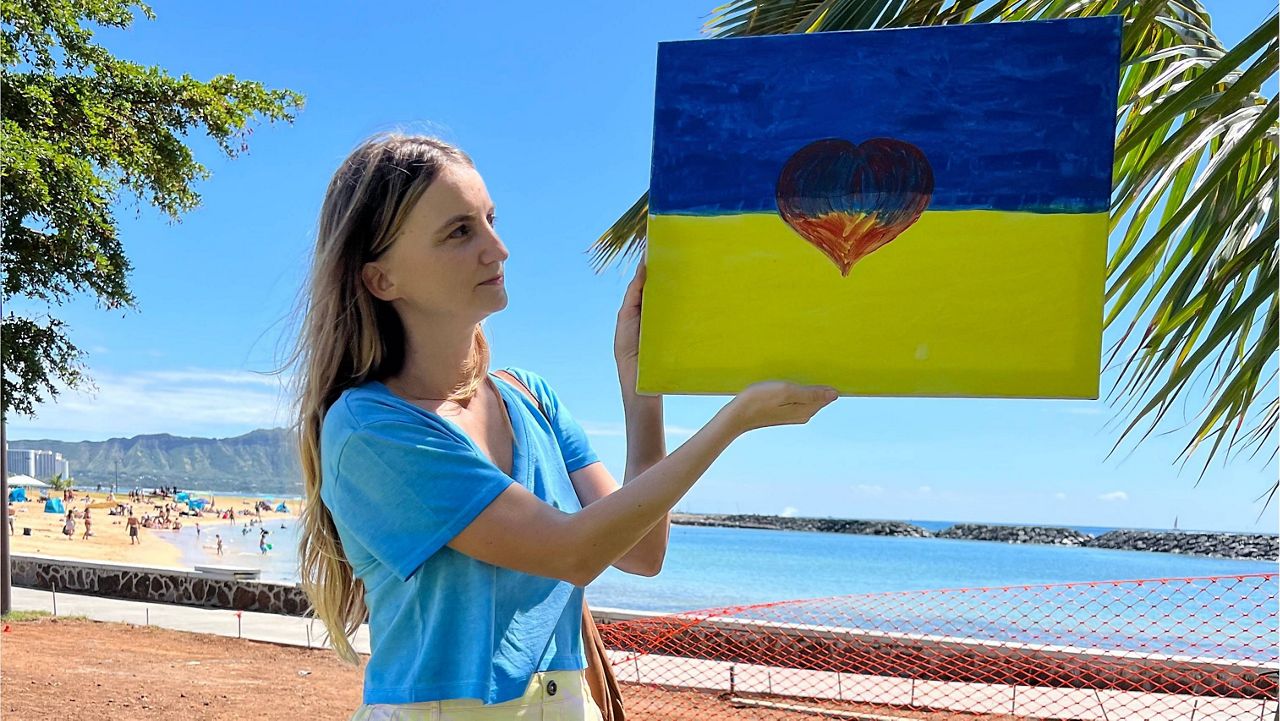This is the second part in a series of interviews with Ukrainians who call Hawaii home. Read the first part, third part and fourth part.
HONOLULU — Four Ukrainians who live in Hawaii spoke to Spectrum News Hawaii about what it has been like watching Russia launch a military attack in their home country. Since the war started on Feb. 24, they all said they have felt a range of emotions from disbelief, shock, extreme sadness, stress, fear, guilt about being away from their home country, and pride for the way Ukrainians and the country's President Volodymyr Zelenskyy have stood up to the Russian invasion.
While for many in Hawaii, Ukraine feels like it’s on the other side of the world — it literally is a 12-hour time difference — Jairus Grove, a political science professor at the University of Hawaii at Manoa said it is important to acknowledge that Hawaii has a Ukrainian community.
He added that people in Hawaii who aren’t from Ukraine care about what’s happening, whether they are an anti-war activist or a member of the U.S. military.
“We … have a lot of anti-war activists in the state who watch these kinds of humanitarian catastrophes very closely,” said Grove. “We have a lot of people who are uniformed members of the U.S. military, who I'm sure are already thinking, ‘Is this a conflict that the United States is going to become involved in? Are we going to be sent to Europe to reinforce NATO allies?’”
He also encouraged anyone who might feel Ukraine is far away to take the time to engage, as everyone's participation is important for a flourishing democracy.
“That’s what makes us different than Russia … our foreign policy is shaped by our discourse and our elections and who represents us,” Grove said.
Russia’s Fake News
Olga Sousa moved to San Francisco when she was 19 years old, after growing up in the city Zaporizhzhia in southeastern Ukraine, where Russian forces have been fighting and seized a large nuclear power plant on March 4. Sousa has now lived in Hawaii for the last eight years.
After learning that Russia had invaded Ukraine, Sousa told Spectrum News Hawaii that she called her mom, who currently lives in San Francisco, and they talked about their worry for Sousa’s 33-year-old brother. He lives in Hawaii, but had returned to Zaporizhzhia the week before the war started, trying to help his wife get out of Ukraine.
“She was just crying,” said Sousa about her mother. “I have such a heavy guilt that I'm here safe. I'm thankful that I'm here, but at the same time I feel guilty that I'm here.”
Sousa is half Ukrainian and half Russian, as her Russian mother moved to Ukraine in the 1980s, where she met her Ukrainian father. Her mom’s sister and her cousins still live in Russia, but she said her mom and aunt stopped speaking five years ago, because her aunt claimed Russia is helping Ukraine and the country should surrender. Sousa said Russian President Vladimir Putin’s rhetoric has brainwashed people.
“It's very heartbreaking,” said Sousa about her family’s division.
Grove said that Russia is good at defining the narrative of what’s taking place through strategic communications and fake news, including perpetuating the false claim that “this is a defensive invasion (and) that (attacking) Ukraine is about protecting Russia.”
“Russia is very good at building stories, which draw people in and they can be conspiratorial (or) they can merely go with people's already existing political preferences, but they're very good at inflaming differences,” said Grove.
Still, Grove said Putin can’t control all the information that comes into the country, especially with the internet. This is part of the reason some Russians are protesting the war in Ukraine.
War crimes
When Sousa first found out that Russia was attacking Ukraine, she said she was in disbelief; despite Russia’s escalation of troops, she never thought they would attack. She checked news reports, but information was just starting to come in, so she called a friend in Ukraine, who told her the apartment building next to her had just been bombed.
“It was so surreal. I felt like I was watching a movie,” said Sousa.
Sousa's grandparents and some of her other friends still live in Ukraine.
“I have a lot of family and friends pretty much all over Ukraine and have my grandparents in Kharkiv, which has been heavily attacked for the last two days,” said Sousa in an interview with Spectrum News Hawaii on Feb. 28.
Kharkiv is the second-largest city in Ukraine, with a population of 1.5 million, and Russia has been attacking the city with airstrikes and rockets. Residential buildings have been damaged and a missile hit the city’s central square on March 1. The city has put up a resistance to Russia’s fighting, with Russian planes shot down and advancing troops slowed.
“Ukraine is so little compared to Russia on the map. Yet, we're sticking up to Russia,” Sousa said. “The strongest feeling I have right now is definitely pride. I'm proud for my people.”
“I'm sad to see people dying, to be honest, on either of the sides,” Sousa added.
Grove, the university professor, told Spectrum News Hawaii that it is clear Russia is committing war crimes in Ukraine right now.
“I think whenever you move heavy artillery, and you're bombing in civilian areas, that is by definition, a war crime,” said Grove. “We may be seeing unprecedented dangerous events unfolding before us.”
The 1949 Geneva Convention Article 8, 2.b defines war crimes, in part, as “intentionally directing attacks against the civilian population as such or against individual civilians not taking direct part in hostilities; intentionally directing attacks against civilian objects, that is, objects which are not military objectives…” and “intentionally launching an attack in the knowledge that such an attack will cause incidental loss of life or injury to civilians or damage to civilian objects …”
The International Criminal Court launched an investigation on March 2 into whether Putin is committing war crimes, crimes against humanity or genocide as the civilian death toll rises and widespread destruction is inflicted on Ukraine.

Finding ways to help
Sousa, who now has U.S. and Ukrainian citizenship, works as a background actor in Hawaii productions, like “Magnum P.I.,” and is a mother to two teenage daughters. Over the many years she has lived in the U.S., she has kept in touch with her high school friends, who now live throughout Ukraine, and every hour she gets updates from them about recent attacks. They tell her they are hiding in basements as sirens warn them of impending rockets and missiles.
“I'm just checking on them all the time because I'm so worried about them,” said Sousa. “I don’t sleep.”
Sousa talked about friends in Ukraine who can no longer send their children to school and are struggling to feed them. In order to help, she sends them information and financial support.
“I felt helpless. I wanted to help my friends to get out. I wanted to support my friends. I wanted to get the word out and I started posting on Facebook and Instagram,” said Sousa. “I was able to send some of my friends money from Western Union.”
To raise funds, she sold artworks that she had recently painted, and sent the proceeds to a friend in Ukraine who used the money to buy diapers and formula from a nearby supermarket, which she gave to a children’s hospital.
“That’s why I think Ukraine is so strong, because Ukrainians, every single person, is doing something and … they are proud of their country,” said Sousa.
Sousa encouraged everyone to contribute, saying even “just a little bit helps,” including posting about Ukraine on social media and adding the Ukrainian flag to profile photos.
Through social media, she spread the word about rallies organized with the help of Hawaii residents and a new Facebook group called “Hawaii We Stand With Ukraine.” Rallies are being held every Friday at the Hawaii State Capitol and Saturday at Ala Moana Beach Park.
“We held the Ukrainian flag. We sang the Ukrainian national anthem. It was so nice to just get together and talk — talk about family and friends and Ukraine,” said Sousa about attending the first two rallies on Feb. 25 and 27.
She said Ukrainians reached out to her and told her how meaningful it was to see that people in Hawaii, which is so far from Ukraine, cared about the assault.



